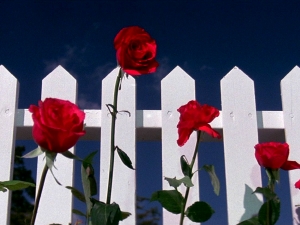David Lynch: Archaeologist of the American Unconscious by M. G. Turner
 I became fascinated by David Lynch roughly eight years ago, during a difficult and crucial period of my life. I was lucky though, for while I was garnering an appreciation for the artist I now consider the leading archaeologist of the American unconscious, I also acquired the practice of Transcendental Meditation, of which David Lynch is among the world’s foremost proponents.
I became fascinated by David Lynch roughly eight years ago, during a difficult and crucial period of my life. I was lucky though, for while I was garnering an appreciation for the artist I now consider the leading archaeologist of the American unconscious, I also acquired the practice of Transcendental Meditation, of which David Lynch is among the world’s foremost proponents.
It came to me almost magically. I had been thinking about adopting a meditation practice, and had dabbled in several forms, until a good friend—whose family happened to be acquainted with Lynch himself—learned the practice and I subsequently joined the party. This experience in meditation was followed by an appreciation of the filmmaker-turned-meditation-advocate: I watched all his movies.
First I saw “Blue Velvet” which represented for me the ending of my childhood and the beginning of what came next. Then I went back to his earlier work, the beautifully absurd “Eraserhead” and the quintessentially humanist “The Elephant Man” which may in posterity’s light be seen as his greatest achievement. Later, “Mulholland Drive” revealed the depravity of an alternate, or perhaps not so alternate, Los Angeles while nodding humbly at Hitchcock and other suspense icons; he has also cited Edward Hopper as an influence. “The Straight Story” is a surprise in and of itself, and adds a touching element to Lynch’s oeuvre and doing much of what the title implies without sacrificing his innate artistic vision. “Twin Peaks” changed the calculus of what American television can accomplish and fashioned a bizarre and complex world that pulsed with reality and intricacy.
It has taken me a few years to really grasp what Lynch’s output means for the larger culture. Not to mention his meditation foundation which these days seems to be his main mission and is doing important work. Its positive impact is well-established and the results it’s achieving in the areas of PTSD and relief of trauma among vulnerable populations deserves the Nobel Peace Prize—if only that institution were more forward thinking, and more open to alternative modalities. However, I want to focus on his artistic output and its importance to contemporary culture. The truth is, America has never felt like more of a Lynchian hellscape. On the surface, as in “Blue Velvet,” there is wealth and beauty, green lawns and bright sunshine—but below the surface, if one simply peers down, there is corruption, degradation, and a deep moral failing at the root of our materialism.
And yet, I have never felt that Lynch was preachy. To the contrary, his view is objective. He is simply presenting reality as he sees it—no matter how bizarre, depraved, or alien. This is where the absolutism of meditation comes in. I use the word “absolutism” to demonstrate the totality of the unified field, the field we reach in Transcendental Meditation, of which Lynch himself is a perennially committed diver. This field feeds the artist’s creativity; in Lynch’s own words it “serves the work and serves the life.” But through Lynch we are also being served a meal of oddities and profundities, which he has dived within to capture and present. For there is something almost incidental about Lynch’s own role in the artistic process. I’m not sure if he would describe it this way, but his language surrounding “catching fish,” which he likens to ideas, seems a unique endeavor in an industry where being a go-getter is praised and people supposedly make their own luck.
The ideas themselves, these fish which he has so patiently waited for and watched swimming under the surface of the mind, and which he has then skillfully fished out—these ideas, in sum, say something vital about our culture. It would be reductive to suggest they say only one thing, but every great artist may only be able to tackle one great idea over the length of a career. In Lynch’s case, with respect to his reluctance to give voice to his reasons and motivations, the question is, how with all we have, with every rolling hill, with every shining sea, with every great thoroughfare to drive down, with every beautiful house that has out front a rich, green lawn, how is it that we are all at base so desperately unhappy? Why do we distrust our neighbors? Why do we hate each other? Yet the corruption Lynch points to is not seen by him as ubiquitous; instead he seems to suggest that these dangerous impulses only control us when we have no conscious knowledge of them. We cannot see them, because most don’t bother to go to the place from which all matter springs; or in other words strive for something deeper.
 This brings me back to meditation. It is impossible to look honestly at Lynch’s work without seeing it in the context of a committed meditator, and a man who has faced his personal darkness every day and put it into his art, rather than into the world. There is a moving anecdote in the probing documentary film “David Lynch: The Art Life” in which he describes taking his father down to the basement of his home to show him his “experiments,” which included the carcasses of dead animals, rotting fruit, and similar earthy paraphernalia. Later, as they are climbing back up the stairs Lynch’s father says “David, I don’t think you should ever have children.”
This brings me back to meditation. It is impossible to look honestly at Lynch’s work without seeing it in the context of a committed meditator, and a man who has faced his personal darkness every day and put it into his art, rather than into the world. There is a moving anecdote in the probing documentary film “David Lynch: The Art Life” in which he describes taking his father down to the basement of his home to show him his “experiments,” which included the carcasses of dead animals, rotting fruit, and similar earthy paraphernalia. Later, as they are climbing back up the stairs Lynch’s father says “David, I don’t think you should ever have children.”
Naturally, Lynch is devastated by this. But in his narration he seems more devastated by the fact that his father misunderstood a pursuit he was deeply excited about, rather than his insensitive command to refrain from procreating. He wants to be understood—but for Lynch the type of understanding he traffics in is not of the conscious understanding that can be easily categorized. His movies enter you at a different, more subliminal level than most movies being made today—perhaps ever. It stands to reason that would be the case, given his almost fifty-year meditation practice and the wisdom he has gathered from it, the wisdom he has sought to infuse, perhaps furtively, into the movies we have all enjoyed and embraced.
All this meant a lot to me eight years ago and still does; given the few degrees of separation between us I could very well have met him, though never have. But I don’t have to meet him to appreciate his work, nor feel personally connected. Truly great artists make us feel as if we know them; they consciously lower the barriers of morality and good taste so that we can have an experience that is free of judgment. These days when most of what is being peddled smacks of 16th century morality plays, where good always wins and the bad are always punished, it is refreshing to have someone stepping in to say “Not so fast. The world is much more complicated, and much more nuanced than anything you can reduce into a simple catchphrase.” Maybe a more concise statement is what the character named Donna Hayward says in “Twin Peaks”—“It’s like I’m having the most beautiful dream and the most terrible nightmare all at once.”
If that doesn’t describe America today, I don’t know what does. All I know is I’m glad David Lynch is around to illuminate us. It’s nice to know someone is meditating for our sins. Maybe one day soon the world will join him.
